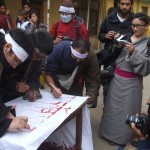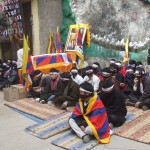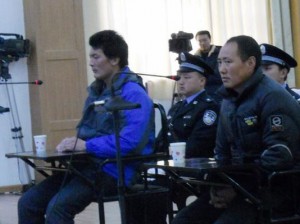Students of Sarah College, and Students for a Free Tibet took part in a hunger-strike and protest march outside the Tsuglagkhan Temple on Monday 11 February, Losar, to raise awareness of human rights abuses in Tibet, and in remembrance of the growing number of Tibetans who have died through self-immolation. The protest resonated with the reluctance within the exile community to celebrate Losar, given the current situation in Tibet and the increasing number of young people turning to self-immolation: “how can Dhasa celebrate”, one young woman asked, “whilst Lhasa burns?”
Rinzin Chodon of Sarah College, a key speaker at the demonstration, delivered an impassioned speech, explaining the core reason for protest as the unjust trial and conviction of Lobsang Konchok, a Tibetan who has been sentenced to death with a two year reprieve by the Chinese authorities. More broadly, she noted, the protest was intended to draw attention to a number of similar perceived injustices in the penal system, notably the disproportionately heavy sentencing for Tibetans believed to have assisted self-immolators in escaping the authorities, and a number of further death sentences carried out in secret –such as that of Lobsang Gyaltsen in 2009.
The demonstration involved a day-long sit-in protest and hunger strike at the entrance to the Tsuglagkhan Temple. Protestors wore masks to symbolise the restriction of free speech, and a coffin formed a bleak reminder of the recent deaths. Supporters were encouraged to take part in a signature campaign. On Monday evening the coffin was walked around McLeod Ganj followed by a candle-lit procession. The following day saw students re-enact the arrest and imprisonment of Lobsang Konchok, and a second protest march.
For Miss Chodon, the protest fundamentally represented a challenge to the misuse of the justice system in China. She argued that such actions will likely serve only to worsen the crisis of self-immolation. “China fails to understand or make any efforts to respectfully approach the issue”, she noted, “China must allow the grievances of Tibetan people to be aired freely, publicly, and openly, without fear of retribution”.






 Print
Print Email
Email